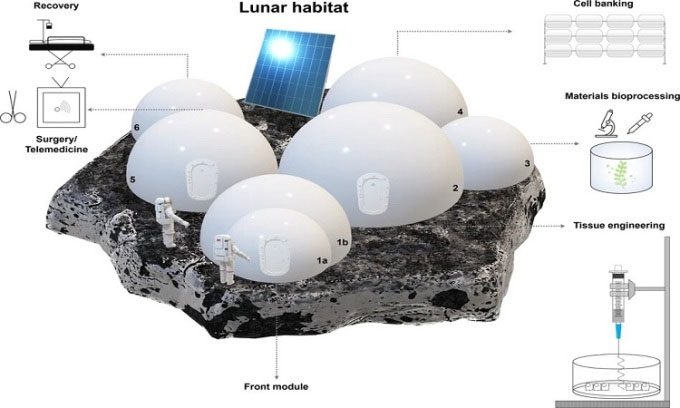A deep underground tunnel in North Yorkshire offers a unique opportunity to study how humans could live and operate on the Moon or Mars.

Design of the Bio-SPHERE experimental facility. (Photo: Microgravity)
Researchers at the University of Birmingham are conducting the Bio-SPHERE project in a unique research facility located 1.1 kilometers underground, in one of the deepest mines in England, as reported by Phys.org on May 23. The project aims to explore how scientific and medical activities could take place in the challenging environments of the Moon and Mars. This facility is the first in a series of new experimental bases aimed at researching solutions to enable humans to work and live healthily during long-term space missions, a key requirement for ensuring continuous operations on another planet.
The research team is collaborating with the Boulby Underground Laboratory, a 4,000 m3 facility focusing on particle physics, Earth sciences, and astrobiology research, operated by the Science and Technology Facilities Council with support from the Boulby mining operator, ICL-UK.
The Bio-SPHERE project is based on a 3,000 m3 network of tunnels adjacent to the Boulby Laboratory, running through 250 million-year-old sedimentary rock, including remnants of the Permian evaporite mineral layer from the Zechstein Sea. This geological environment, combined with its depth, allows researchers to replicate the working conditions that humans would experience in similar caves on the Moon and Mars, including remote locations, limited access to new materials, and challenges in moving heavy equipment.
Additionally, due to the extremely low radiation environment at such depths, this location will help scientists understand how effectively underground environments can protect crews from deep space radiation. This poses a significant risk in space exploration, alongside other dangers such as meteorite debris threatening to destroy life-supporting infrastructure.
The first facility to open as part of Bio-SPHERE will house a specially designed 3-meter-wide simulation module intended to test the bioprocesses necessary for preparing treatment materials for tissue damage, such as complex fluids, polymers, and hydrogels used in regenerative medicine to aid wound healing or materials that reduce damage.
Bio-SPHERE has multiple functions in sterilization and material handling, combining the simulation module and useful geological environments with access to adjacent physical and chemical laboratories. This presents an opportunity to simulate various mission scenarios and conduct interdisciplinary scientific research, from the effects of extreme environments to the availability of local resources, according to the research team leader, Dr. Alexandra Iordachescu from the School of Chemical Engineering at the University of Birmingham.


















































